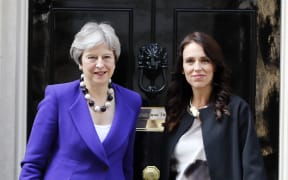New Zealand exporters could have powerful allies in its fight to retain existing trade rights in a post Brexit European Union.

Photo: Wikimedia Commons / Alex Proimos
The United States, Canada, New Zealand and Australia are all faced with having their trading rights carved up between Britain and the EU rump after Britain's withdrawal.
New Zealand exporters regards this split as completely unfair, and has registered its opposition with the World Trade Organisation.
However, the Trade Minister David Parker said this was not a formal complaint headed for a judicial hearing - rather New Zealand was making use of the WTO's negotiating mechanisms.
A New Zealand source compares the offer from London and Brussels to the case of a married couple who get divorced, and then try to alter liabilities they entered into when they were still a pair.
The ratio of the split of trading rights between London and Brussels has not yet been determined, though there has been talk of a 50/50 division.
But whatever the final figure, a formalised division would rob New Zealand of marketing agility in putting its products in the right place at the right time, according to David Parker.
"That loss of flexibility would be disadvantageous to our exports," Mr Parker said.
"If you look back over history, there have been times when quite a bit of sheepmeat went into the UK, whereas at other times it goes into the other countries of the European Union.
"That flexibility could now be lost."
Right in the front line of this issue is the meat industry, which sells product worth $1.8billion a year.
It has always sought to market product to suit changing patterns of demand, such as Greek Easter, holiday makers in Spain, or the British Sunday roast, and it fears a strict division would make that hard to achieve.
Tim Ritchie of the Meat Industry Association went further, saying New Zealand has a contractual arrangement with the European Union that it would not give up.
"New Zealand has its legal rights in terms of access that were negotiated and paid for some time ago," he said.
"From our point of view both the quantity and quality of that access is paramount and we are not prepared to see that go."
It is unclear whether the presence of powerful countries in the same position as New Zealand will help or hinder.
On the one hand, New Zealand could push its way across the line in the middle of the scrum, as it were, and score without having to fight a solo battle.
On the other hand, powerful countries might be able to apply pressure that New Zealand cannot.
It is unclear how long this standoff will last, since it is also unclear how Brexit itself will finally be carried out.




